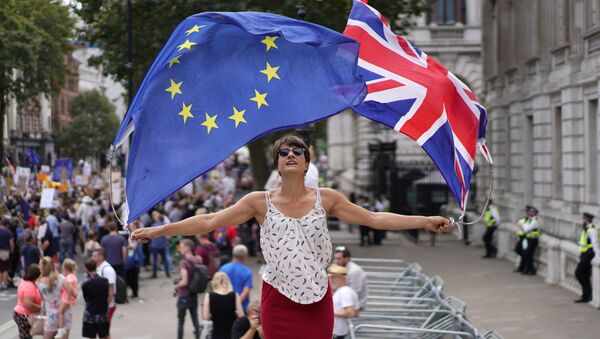MPs have voted in favour of a bill, moved by Labour MP Hilary Benn, which requires the UK government to request a delay in Brexit beyond 31 October if no new deal is agreed with the European Union.
The vote, by 329 to 300, was the second successive defeat for the government, who lost a vote on Tory rebel MP Oliver Letwin's motion to take over the parliamentary agenda.
The bill is now set to proceed to the second phase of reading in Parliament and may eventually force the government to seek a Brexit extension if a no-deal scenario is still in place by 19 October.
Earlier the Prime Minister said he would call a General Election on 15 October if Mr Benn’s bill was approved by MPs and he called Labour leader Jeremy Corbyn "a big girl's blouse" for not agreeing to the election.
Good to hear @Keir_Starmer confirm at the despatch box that Labour will not back an election until the Bill preventing no deal is enacted & its provisions - including an #Article50 extension implemented.
— Ben Bradshaw (@BenPBradshaw) September 4, 2019
But the next general election is not due until 2022 and under the Fixed Term Parliament Act the Prime Minister needs a two-thirds majority to call an election.
Mr Johnson is believed to be gambling on winning a general election and then having a mandate to push through a no-deal Brexit, having deselected the rebellious 20 or so Tory MPs.
Labour’s Keir Starmer has already said the opposition will not vote for an election unless legislation is passed ruling out a no-deal Brexit.
— Hilary Benn (@hilarybennmp) September 2, 2019
But some experts have said that even if legislation is passed it could easily be repealed by a new government after an election.
Opening the debate Mr Benn said his European Withdrawal (Number 6) Bill would effectively delay the moment when Britain would have to decide what to do about Brexit.
But he said: “If you are offered a choice between jumping off a cliff, and waiting for three months before jumping off a cliff, it makes sense to wait.”
In June 2016 the majority of British people voted to leave the European Union but were told by the Leave campaign that the government would be able to negotiate an acceptable deal.
— John Rentoul (@JohnRentoul) September 4, 2019
In the event Theresa May’s government negotiated a withdrawal deal in November 2018 but it was rejected three times by Parliament, largely because of the so-called Irish backstop clause.
Eventually Mrs May resigned in May and after a leadership contest the Tories elected Mr Johnson, who became Prime Minister. On taking office he said he would force Britain to exit the EU by 31 October with or without a deal.
— Arnie 🇬🇧 (@arnie61) September 4, 2019
In Wednesday’s debate the former chancellor, Phillip Hammond, said Mr Johnson had set the bar too high when he expected the EU to remove the Irish backstop altogether.
He said: “I’d rather boil my head than hand power to the leader of the opposition (Jeremy Corbyn)…but this bill is not an attempt to hand power to the leader of the opposition.”
— steve hawkes (@steve_hawkes) September 4, 2019
Alistair Burt, one of the Tory rebel MPs who is co-sponsoring the bill, said when he first became an MP Parliament was dominated by “giants” like Denis Healey and Willie Whitehall who had served in the war and were committed to Europe because they wanted to avoid another conflagration on the continent.




